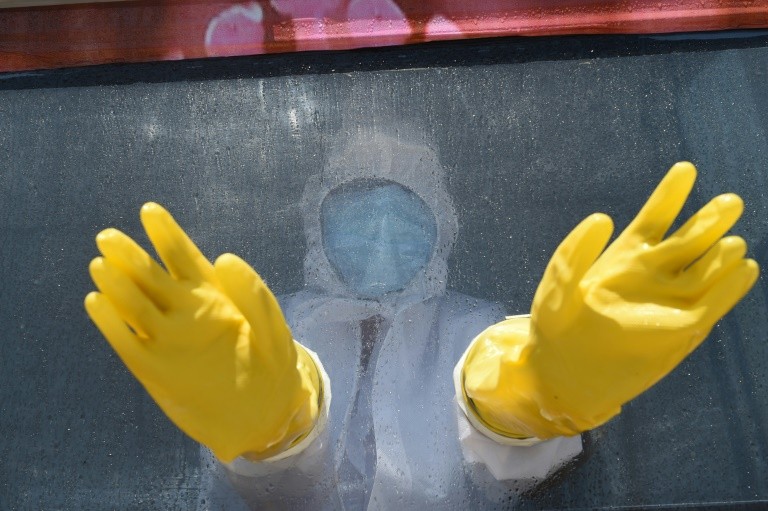The world grappled with the economic pain of the coronavirus pandemic Thursday as divided EU leaders faced dire warnings to act quickly and US jobless claims soared to a staggering 26 million.
European Central Bank boss Christine Lagarde said her colleagues risked “doing too little, too late” as they met to discuss a huge rescue plan, but Europe remains deeply split between the debt-hit south and richer north.
Worldwide, governments are trying to ease lockdowns and repair economic damage whose like has not been seen for centuries, while fearing that moving too fast could unleash a second wave of COVID-19 cases.
While the disease appears to be peaking in Europe and the United States, the “unimaginable human tragedy” deepened with the WHO saying half of all deaths in some European countries were in care homes.
Other nations are still in the early stages of the fight against a disease that has killed more than 180,000 people and infected 2.6 million worldwide, while leaving around half the planet’s population confined to their homes.
– Spirit of solidarity’ –
In Europe, the worst-hit continent with 110,000 deaths, EU leaders haggled via video conference on a giant economic recovery package estimated at around one trillion euros.
At the end of the meeting the 27 leaders asked the European Commission, the bloc’s executive arm, to come up with a plan by May 6, sources told AFP.
Read Also: More Tigers, African Lions Test Positive For Coronavirus
The fight has reopened the wounds of the 2009 economic crisis with debt-laden southern states like Spain and Italy, both badly hit by the disease, demanding help to get back on their feet.
“With the pandemic, nobody calls,” says Pedro Oran, a 53-year-old Spaniard who usually works by helping a plumber, as he lined up to collect food for the first time at a Madrid soup kitchen.
But richer northern countries like Germany and the Netherlands, while saying they are ready to help for now, insist they will not take the long-term step of pooling debt with Mediterranean governments they accuse of profligacy.
“In the spirit of solidarity, we should be prepared to make completely different, that is to say significantlyhigher contributions to the European budget over a set period,” German Chancellor Angela Merkel told lawmakers in Berlin.
Lagarde warned against inaction, saying the bank’s worst-case forecast the bloc’s GDP could fall by as much as 15 percent in 2020.
The pain is also being felt in Britain, which left the EU earlier this year. A Bank of England policymaker said Thursday that Britain’s likely recession would be “deeper than anything we have seen in the past century, or possibly several centuries.”
– ‘Long way to go’ –
In the United States — the hardest-hit country on earth — data showed another 4.4 million US workers filed claims for jobless benefits, bringing the total since the pandemic struck there in mid-March to 26.4 million.
Lawmakers from the US House of Representatives donned masks to vote on another half-trillion dollars to prop up the US economy, battered by government-ordered shutdowns to stop a virus that has already killed more than 46,500 and infected nearly 840,000 Americans.
Some European countries have slightly eased coronavirus measures but bans on large gatherings have been extended, and restaurants, bars and sporting events remain off limits.
Governments elsewhere are taking similar steps, with Vietnam’s communist authorities easing social distancing measures, with experts saying its apparently low number of cases was down to aggressive containment and contact tracing.
“We go to each and every alley, knocking on each and every door,” said Nguyen Trinh Thang, a 72-year-old Hanoi resident who is part of a team tasked with zeroing in on any suspected cases.
Yet World Health Organization chief Tedros Adhanom Ghebreyesus on Wednesday cautioned that the struggle is far from over.
“Make no mistake: we have a long way to go. This virus will be with us for a long time,” he said.
The WHO and other health experts have warned that strict measures should remain until there is a viable treatment or vaccine.
The race is on around the world, with Britain’s Oxford University launching a human trial of a potential coronavirus vaccine on Thursday, while Germany announced that similar trials will start by next week.
In France, meanwhile, scientists said nicotine may have a protective effect against coronavirus and will trial patches to see if it works.
The theory is based on the low number of smokers among those hospitalised with the disease, according to various studies.
– China boosts WHO funding –
While the planet looks to science for a cure, the response to the coronavirus is becoming increasingly politicised.
China announced on Thursday that it will donate another $30 million to the WHO to help fight the pandemic, days after US President Donald Trump said he would freeze funding to the UN body.
Trump accused the WHO of covering up the seriousness of the COVID-19 outbreak in China before it spread around the rest of the world. The US is the WHO’s biggest contributor.
Meanwhile the virus’s impact on culture and religion continues.
Islam’s holy fasting month of Ramadan is due to start on Friday, Saudi Arabia announced, with Muslims worldwide facing unprecedented restrictions to counter the disease.
AFP
